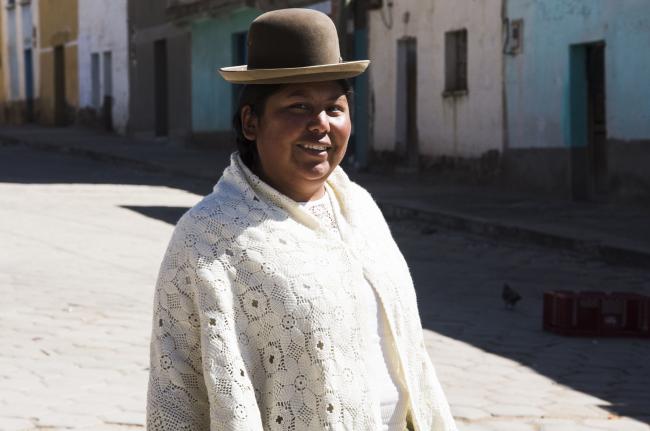by ALICE CAMPAIGNOLLE, IRENE ESCUDERO, & CARLOS HERAS
 The mayor of Collana, Bertha Quispe, in the central square of the village. PHOTO/Irene Escudero
The mayor of Collana, Bertha Quispe, in the central square of the village. PHOTO/Irene Escudero
In Bolivia, women in power, such as Indigenous mayor Bertha Quispe, often suffer political harassment and violence.
Bertha Quispe was 28-years-old when she was elected mayor of Collana, a small town in the Bolivian Altiplano of just over 5,000 inhabitants, who work primarily in ranching and open-pit mining. Quispe is young, an Indigenous Aymara—like most of the inhabitants of Collana—and originally from a small community in the municipality.
She entered a world dominated by men in a country where women’s political participation is rapidly growing. Since 2014, a majority of the national parliamentarians have been women, and since the 2015 municipal elections, women have had a 51 percent of representation in municipal councils. However, Quispe is one of only 29 women mayors in Bolivia: only 8 percent of the country’s municipalities have a female mayor.
Quispe is the first woman mayor of Collana. All of the town’s previous mayors were male, older, and lived in the municipality’s main urban center. Once elected, those surrounding her—Indigenous authorities, local union representatives, and office visitors—were predominantly male.
Quispe had initially studied in the municipality but completed high school in the city of El Alto, an hour away by public transportation. There, in the second largest city in Bolivia, she majored in social work before returning to her village, where she became a schoolteacher and began to participate in grassroots organizations, such as the Sindicato de Mujeres Campesinas Bartolina Sisa (Bartolina Sisa Women Farmers’ Union).
Leading up to the 2014 municipal elections, each of the seven territories that make up Collana held local caucuses under the Movement Towards Socialism (MAS), the party of President Evo Morales, where they created an assembly of proposed candidates for mayor and councilor positions. Guided by principles of gender equality and complementarity, each assembly was required to propose two candidates: a man and a woman. They consulted Quispe by phone and she accepted to run. She said she identifies with “the process of change” Morales represents.
Soon after, an assembly chose Quispe to represent the MAS in the local election. On March 29, 2015, Quispe won with a small margin of 51 votes. The victory was so close that her party was left with a minority in the Council, holding just two of five seats. This was the outcome of some voters having supported her mayoral candidacy but having chosen others outside of the party for the council.
Yet a few months after she became mayor, in June 2015, Quispe began to suffer political harassment and violence. There was some ongoing tension between councilors and other male social leaders, but the real conflict set off at the end of February 2016.
Quispe had devised a new urban planning structure that changed the boundaries between the different communities of Collana. Her opponents accused her of favoring her community, Ichuralla Chico, and of acting without the approval of the Council, which she denies.
